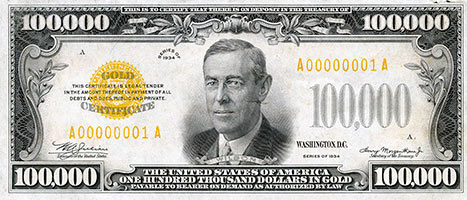Early Life and Education
Woodrow Wilson was born on December 28, 1856, in Staunton, Virginia, but lived in Georgia and South Carolina in his childhood as well. He was the third of four children. Wilson was well education and graduated from Princeton University in 1879 where he excelled at debate. Following his graduation, Wilson attempted to study law, but found his studies laborious. Instead, Wilson was accepted to a Ph. D program in political science from Johns Hopkins University in Baltimore. He graduated three years later. A year earlier, Wilson married Ellen Axson.
Professor and Author
Following his Ph. D, Wilson served as a professor at Cornell University, Bryn Mawr College Wesleyan University and eventually Princeton. During this time Ellen gave birth to two daughters, Margaret and Jessie. Wilson soon became an accomplished political science and history author. His texts on the function of government and 19th century history were used in many American universities. By 1902, Wilson had been elevated to president of Princeton University, a position which he held for eight years.
Out of Nowhere!
In 1910, Wilson took the political world by storm when he was elected as governor of New Jersey and then won the Democratic nomination for president in 1912. Wilson, who advertised himself as a "progressive," easily won the election over Republicans William Howard Taft and Theodore Roosevelt. Wilson would become the nation's first southern-born president since Zachary Taylor in 1848. In 1914, however, Wilson's wife died of kidney disease. Wilson would marry Edith Bolling the following year.
As President..
Acts Passed During Wilson's Presidency: |
| |
| The Federal Reserve Act - This act authorized the creation of the Federal Reserve System, America's central banking system. The act also authorized the bank to create a print "legal tender," at the time referred to as Federal Reserve Notes. |
| |
| The Clayton Antitrust Act- This act prohibited monopolistic behavior by large companies. Similar to the 1890 Sherman Antitrust Act, the Clayton Antitrust Act also specified specific illegal behaviors, described enforcement, remediation, and exemptions to the act. |
| |
| The Revenue Act of 1913 - re-introduced income tax to citizens. At the time, a one percent income tax was imposed on individuals making more than $3,000 per year or families that made more than $4,000 per year. It also lowered tariffs from 40 to 25 percent for goods entering the United States. |
| |
| The Adamson Act - This act established the standard eight-hour workday for employees of agencies or companies engaged in interstate or international commerce. The passage of the act prevented a nationwide railroad workers strike. |
| |
| Selective Service Act of 1917 - This act allowed the United States military to raise an army through conscription (the draft) in preparation for entry into World War I. |
World War I
Wilson's second term was dominated by World War I. Upon the outbreak of the war, Wilson maintained a policy of neutrality, even after German U-boats sunk several ships that carried American passengers, including the British liner RMS Lusitania. When Germany refused to curtail their submarine warfare, and attempted to broker a partnership with Mexico, Wilson declared war on Germany citing, "the world must be must be made safe for democracy." Over 2.8 million men and boys were drafted for military service. Wilson successfully guided the nation through the war.
Fourteen Points
In 1918, Wilson issued his famous "Fourteen Points," a statement and speech outlining his vision of a free world, successful foreign policy, democracy, trade equality, free navigation, and solutions to territorial disputes in Europe. His speech ended with the promotion of the League of Nations, an organization of nations formed to promote world peace, disarmament, and diplomacy. In 1919, Wilson was issued the Nobel Peace Prize for his work in promoting the League of Nations.
Nineteenth Amendment
In 1918, Wilson promoted the passage of the 19th Amendment, which gave women the right to vote. In October of 1919, however, Wilson suffered a serious stroke, leaving him partially paralyzed. Following his second term in office, Wilson and his wife moved to a townhouse in Washington, D.C. On February 3, 1924, Woodrow Wilson died from another stroke. His wife would live in the townhouse another 37 years before dying at the age of 89. On the day of her death, the Woodrow Wilson Bridge, connecting Maryland and Virginia, was dedicated. In 1934, the $100,000 bill, the largest U.S. Currency note ever printed, honored Woodrow Wilson.

|
| Woodrow Wilson on the United States $100,000 bill |